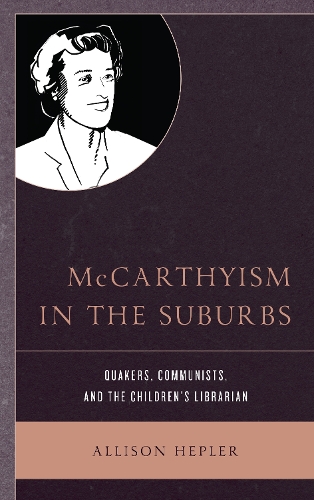
McCarthyism in the Suburbs: Quakers, Communists, and the Children's Librarian
(Hardback)
Available Formats
Publishing Details
McCarthyism in the Suburbs: Quakers, Communists, and the Children's Librarian
By (Author) Allison Hepler
Bloomsbury Publishing PLC
Lexington Books
12th June 2018
United States
Classifications
Professional and Scholarly
Non Fiction
Social and cultural history
Gender studies: women and girls
Physical Properties
Hardback
208
Width 161mm, Height 233mm, Spine 20mm
522g
Description
In 1953, Mary Knowles was fired as a branch librarian for the Morrill Memorial Library, a public library in Norwood, Massachusetts. She had been called before the Senate Internal Security Subcommittee and, when asked if shed ever been a member of the Communist Party, she declined to answer, relying on her Fifth Amendment rights. She was fired less than three weeks later. Knowles thought she was unlikely to find a position as a librarian again and left the area. She found a job at a small library outside Philadelphia, where anticommunists who learned of her past tried to create public support for a Loyalty Oath, resulting in the loss of public funding for the library. The resulting controversy eventually brought national attention to the local Quakers who had hired Knowles, the FBI was asked to investigate, Knowles was convicted of contempt of Congress, and the Quakers were subpoenaed and testified before the House Un-American Activities Committee. Knowles, however, was never fired from this position, retiring from the library in 1979. This book illustrates the impact of McCarthyism on small towns and ordinary people and local officials, some of whom abided by the standards of the era. There were others however, who challenged the status quo. Their actions provide readers with models of behavior often at odds with what has been thought of as the 1950s. People who spoke up risked families and jobs. At the same time, anticommunists also tapped into citizens fears of the cold war, not just of Communists but of a broad swath of people who promoted social justice and equality. The resulting interactions as described in this book offer important lessons on how fear and bravery operate local communities against the backdrop of (and involvement with) national events.
Reviews
Histories of McCarthyism have almost always focused on the big fish brought before congressional investigating committees. In contrast, Allison Hepler shows in her excellent case study of librarian Mary Knowles how the anti-communist witch hunts of the postwar period could afflict largely anonymous persons and roil the communities in which they lived. In this case, the drama unfolded in Plymouth Meeting, Pennsylvania, a suburb located just outside Philadelphia that takes its name from the local Quaker Meeting. Happily, Quaker values and the defense of friends, mainly of local women, allowed Knowles to keep her position until retirement. Heplers study is essential reading for anyone who wants to have a fuller understanding of Americas McCarthy era. -- David R. Contosta, Chestnut Hill College
The story of McCarthyism in the United States is usually told as a national story of famous actors testifying before Congressional committees faced with decisions about whether or not to name names. Allison Heplers thoroughly researched book provides a perspective of McCarthyism at the local level, focused on the case of Mary Knowles, a local librarian in the small community of Plymouth Meeting, northwest of Philadelphia. Hepler unravels the threads as Mary Knowles and local organizationsfrom the American Legion to the Society of Friends (Quakers)take positions on whether to fire or retain Mary Knowles. This book should encourage more local studies of McCarthyism in the 1950s. It also provides a case study of how communities at the local survive when hot-button national issues are being fought out at the local level. -- Christopher Densmore, Swarthmore College
Author Bio
Allison Hepler is professor of history at the University of Maine at Farmington.
